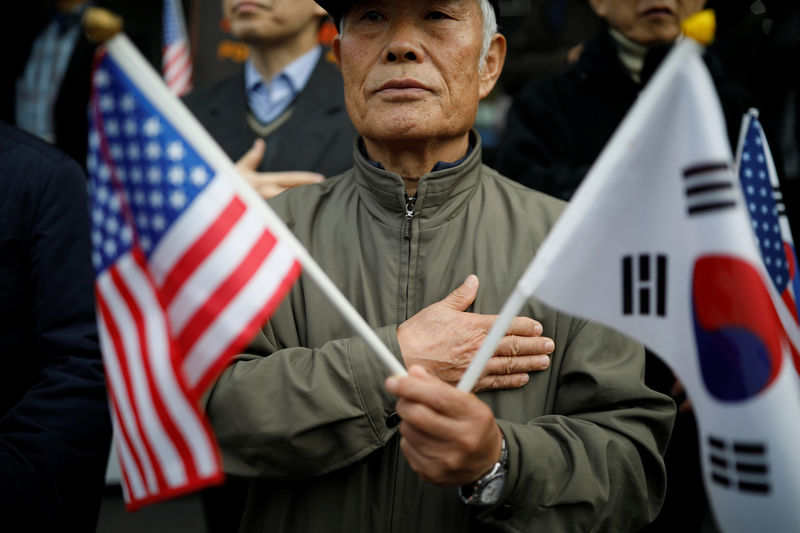By Steve Holland and Matt Spetalnick
TOKYO/SEOUL (Reuters) - U.S. President Donald Trump will step directly into the shadow of the North Korean nuclear standoff on Tuesday on a visit to South Korea in which his words alone could risk further inflaming tensions with North Korean leader Kim Jong Un.
The White House says Trump’s trip is intended to demonstrate U.S. resolve over his hard-line approach to the North Korean nuclear and missile threats, but many in the region fear that further bellicose presidential rhetoric could increase the potential for a devastating military conflict on the Korean peninsula.
Arriving in South Korea on the second stop of a five-country trek, Trump will tour the main garrison for U.S. troops stationed in South Korea, the sprawling Camp Humphreys, which lies about 100 km (60 miles) from the border with reclusive North Korea.
Trump is seeking to ratchet up pressure on Pyongyang following a visit to Tokyo, where he said on Monday that America was working to counter North Korea’s “dangerous aggressions” and talked about Japan being able to shoot North Korean missiles “out of the sky” once it completes purchases of U.S. military equipment.
The South Korea visit also aims to shore up an uneasy alliance between Washington and Seoul, which has come under U.S. pressure over trade and defense spending.
Trump has rattled some U.S. allies with his vow to “totally destroy” North Korea if it threatens the United States, for deriding Kim as a “Rocket Man on a suicide mission” and for dismissing as pointless any diplomatic engagement with Pyongyang.
Kim, who has also made clear he has little interest in negotiations, at least until North Korea develops a nuclear-tipped missile capable of hitting the United States, has called Trump a “mentally deranged U.S. dotard.”
South Korea’s spy agency said last week that North Korea may be preparing another missile test, raising speculation that such a launch could be timed for Trump’s 12-day visit to the region. U.S. officials have said privately that intercepting a test missile is among options under consideration, though there is disagreement within the administration about the risks.
U.S. Marines and South Korean forces will be conducting previously planned joint military drills in the northwestern part of South Korea during Trump’s visit, South Korea’s defense ministry said on Monday, an action that could further aggravate tension with Pyongyang.
Defending his tough talk against North Korea, Trump said in Tokyo: "Some people said that my rhetoric is very strong. But look what's happened with very weak rhetoric over the last 25 years. Look where we are right now.”
SEOUL WARY OF PLAYING SECOND FIDDLE TO JAPAN
U.S. ally South Korea, meanwhile, is rolling out the red carpet for Trump but is also sensitive to the fact that he plans to spend only 24 hours in the country compared to 48 hours in Japan, the kind of comparison that South Koreans often make because of concerns they are a lesser U.S. priority than Tokyo, its richer neighbor.
While Trump has forged a strong bond with Japanese Prime Minister Shinzo Abe as well as Chinese President Xi Jinping – who will host him later this week – South Korean officials say there has been less personal chemistry between him and their new liberal president, Moon Jae-in.
During the state visit, South Koreans are also bracing for the possibility that Trump will renew his criticism of Moon over his support for diplomatic engagement with Pyongyang – something the U.S. president once called “appeasement” – and will again threaten to pull out of a free trade pact between the two countries.
Trump has accused South Korea in the past of not paying its fair share for the cost of U.S. forces in the country. A South Korean presidential official said that Trump’s visit to Camp Humphreys would be a chance to inform him that Seoul paid more than 90 percent of some $10 billion in land and construction costs for the base.
The North accuses the United States, which has 28,500 troops in South Korea, a legacy of the 1950-53 Korean war, of planning to invade and regularly threatens to destroy it and its Asian allies.
Trump will steer clear of the heavily fortified demilitarized zone (DMZ) zone on the border between the two Koreas - where other U.S. presidents have visited - a move that might have been seen by North Korea as more of a provocation.
But the base visit will give him a first-hand view not only of the massive military assets the United States has in place in South Korea but also could serve as a reminder of the cost in U.S. military lives – as well as the potential massive South Korean civilian losses – if the current crisis spirals into war.

Trump will also have talks on Tuesday with Moon at South Korea’s presidential Blue House, hold a joint news conference and attend a state dinner with traditional music and K-pop performances. He will wrap up his visit on Wednesday with an address to the National Assembly.